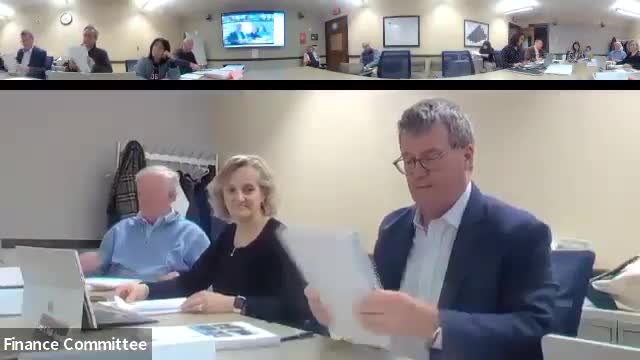Finance Committee recommends $19.6 million for Cogswell public‑works facility despite some members urging delay for bids
Get AI-powered insights, summaries, and transcripts
Subscribe
Summary
The Finance Committee on April 14 recommended that Town Meeting appropriate $19,600,000 for Phase 1 of a multi‑phase public‑works facilities plan at the Cogswell site to relocate mechanics and provide upgraded maintenance, shop and staff facilities.
The Town of Needham Finance Committee on April 14 recommended a warrant article to appropriate $19,600,000 for Phase 1 of the Cogswell public‑works facilities improvements, a project the town describes as the first step in a phased plan to replace and upgrade aging DPW and RTS facilities.
Why it matters: The Phase 1 appropriation would fund a new maintenance and vehicle facility intended to remove mechanics and other staff from the existing, deteriorating 470 Central Ave. building. Committee members said moving mechanics to an improved work environment is urgent but questioned whether the town should wait for competitive bids before committing the full contingency the project carries.
Project scope and costs: Town staff described Phase 1 as a campus‑style facility to house mechanics, showers and changing rooms that also would serve RTS staff. Presenters said site‑specific work increases costs on the selected parcel, with unique site preparation estimated at roughly $1,000,000 to $2,000,000. The presenters said the Phase 1 baseline construction estimate was about $14,400,000 in an earlier feasibility study and was updated to $19,600,000 after inclusion of soft costs, contingency and inflation allowances (typical design contingency, escalation and a carried contingency to address uncertainties in MEP systems and tariffs).
Timing and bidding concerns: Several committee members argued that going to town meeting with the full $19.6 million appropriation could expose the town to higher costs if bidders see a large contingency in the advertised project amount. Others noted statutory constraints around bid award timelines and the town’s obligation to advertise its cost estimate. Presenters said they expect multiple qualified bidders and that the town would prequalify general contractors for a project of this scale; they also said the project's bid timeline could be controlled to limit exposure. The committee discussed the option of delaying a vote until after competitive bids are in hand, possibly in October, but ultimately proceeded with a recommendation vote at the April 14 meeting.
Energy and code choices: Town staff and the project team said the project is being designed to high energy standards, including passive‑house elements and ground‑source heat pumps, and that those choices may make the building eligible for DOER (Department of Energy Resources) grants and Mass Save rebates. Presenters said the passive‑house approach reduces life‑cycle operating costs but raises upfront costs and that some federal programs (for example IRA‑linked funds) could provide additional rebates.
Interim improvements and risk: Committee members asked what interim repairs could be made to the existing 470 facility if full funding were delayed. DPW staff said some cosmetic and safety measures (paint, exit signage, limited bathroom work) are feasible but that major fixes — exhaust ventilation, higher ceilings and required ADA/seismic upgrades — would likely trigger building‑code requirements and push the project past thresholds that make partial repairs impractical.
Committee action: A Finance Committee member moved and a second supported a motion to recommend adoption of the $19.6 million article; the motion carried with recorded opposition noted in the meeting transcript (members did not provide a roll‑call tally in the record). The committee’s recommendation will be part of the warrant materials presented to Town Meeting.
Next steps: Presenters will proceed with prequalification of bidders and continued design, and the project team said they will provide the committee with a more detailed cost breakdown and the design documents before the town’s bidding phase. Several committee members asked staff to bring the bid‑ready numbers or, alternatively, to explain the risks and contingency needs if the appropriation remains on the May warrant rather than being deferred until October.
